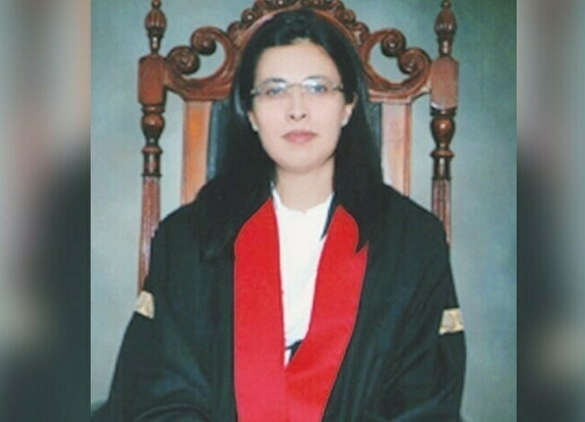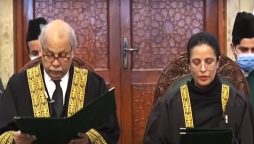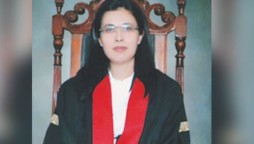- She has been a lecturer in Banking Law at the University of Punjab and Mercantile Law at College of Accounting and Management Sciences (CAMS) in Karachi.
- In January 2019, she became the president of a newly-formed Committee for Protection of Women Judges in Lahore.
- On 24 January 2022, Justice Ayesha Malik took her oath as a Supreme Court judge and formally became the country’s first-ever female judge to reach the apex court.

Early Life and education
Ayesha A. Malik was born on 3rd June 1966 in Karachi. She received her basic education from schools in Paris and New York and completed her A-Levels at Francis Holland School for Girls in London.
She attended the Karachi Grammar School and earned her Bachelor of Commerce degree from the Government College of Commerce & Economics, Karachi.
She received her law degree from Pakistan College of Law and her LL.M. from the prestigious Harvard Law School, where she was named London H. Gammon Fellow 1998-1999 for outstanding merit and academic excellence.
Legal career
Justice Malik started her legal career working at Fakhruddin G. Ebrahim & Co law firm and went on to become a senior partner at Rizvi, Isa, Afridi & Angell, where she headed the Corporate & Litigation Department at the firm’s Lahore office.
She has been a lecturer in Banking Law at the University of Punjab and Mercantile Law at College of Accounting and Management Sciences (CAMS) in Karachi.
Lahore High Court
On 27th March 2012, Ayesha Malik became Justice of the Lahore High Court where she served for a decade before being elevated to the Supreme Court of Pakistan.
Justice Ayesha Malik’s legal practice consists of appearances in the High Courts, District Courts, Banking Court, Special Tribunals and Arbitration Tribunals.
As a judge of the high court, in addition to her position on the bench, she served on the board of the Punjab Judicial Academy and as chair of a federal review committee addressing matters relating to women in the judiciary.
She has been a member of the National Judicial Automation Committee overseeing case management, the pace of litigation and effectively harnessing information technology to ensure speedy dispensation of cases.
In January 2019, she became the president of a newly-formed Committee for Protection of Women Judges in Lahore. The committee was formed to address issued faced by female judges in district courts.
Justice Ayesha Malik is also a part of the International Association of Women Judges (IAWJ), an initiative for women empowerment through equality and justice for every girl and woman.
She has appeared in England and Australia as an expert witness in family law cases involving child custody, divorce, women’s rights, and constitutional protection for women in Pakistan.
She has authored several notable judgments with specific reference to women’s rights and gender equality. She is a strong advocate of the importance of gender perspective in upholding the rule of law.
Ayesha has chaired the Judicial Officers Female Supervisory Committee which looked at all issues related to female judicial officers. She has also heard cases related to environmental justice and worked on expediting the litigation process through automation and case management.
First female Justice of Supreme Court
Justice Ayesha Malik made history when she was sworn in as the first female judge in the Supreme Court of Pakistan.
On 24 January 2022, Justice Ayesha Malik took her oath as a Supreme Court judge and formally became the country’s first-ever female judge to reach the apex court.
The appointment was not without controversy as some lawyers and judges had voiced their opposition as Justice Malik was fourth in seniority list. The Pakistan Bar Council and Supreme Court Bar Association had called for a countrywide protest over the disregard for seniority in the appointment of judges.
The discord ended when the Judicial Commission of Pakistan (JCP) approved the elevation of Justice Ayesha Malik to the Supreme Court.
Chief Justice of Pakistan Gulzar Ahmed chaired the meeting during which Justice Malik’s elevation was approved by a majority of five votes against four. In September 2021, the JCP has rejected her elevation due to lack of consensus.
According to the seniority list, Justice Malik will become the 34th Chief Justice of Pakistan on 23 January 2030. She will retire from service on 2nd June 2031.
Landmark verdict on sexual violence
As a judge of the Lahore High Court, Justice Ayesha Malik passed a ground-breaking judgment in 2021 against sexual violence and rape cases.
She ruled that virginity testing for victims of sexual violence violated fundamental rights of life, equality, dignity and privacy protected by the Constitution. Consequently, this judgment made a rape victim’s prior sexual history inconsequential in the prosecution of the crime.
The court declared virginity tests, including the two-finger test (TFT) for examination of sexual assault survivors “illegal and against the Constitution” and had “no forensic value” in cases of sexual violence.
In the judgment, Justice Malik wrote that the virginity test “offends the dignity of the female victim” and were discriminatory as they are carried out on the basis of their gender.
The judge directed the federal and provincial governments to take necessary steps to ensure that virginity tests are not carried out in medico-legal examination of the victims of rape and sexual abuse.
She also directed the Punjab government to “devise appropriate medico-legal protocol and guidelines according to established international practices to recognize and manage sensitively the care of victims of sexual violence”.
As a result, the provincial governments of Punjab and Sindh ordered health departments to stop virginity tests. The Supreme Court later upheld that virginity testing has no relevance in cases of sexual violence.
Other activities
She also volunteered at Hermann Gmeiner School, Lahore, teaching both English Language and Development in Communication Skills.
She has worked for various NGOs and has focused specifically on poverty alleviation programs, micro-finance programs, and skills training programs.
Her publications have been featured in the International Journal of Competition Policy and Regulation Global Law Review, Oxford Reports on International law in Domestic Courts, and the Journal of World Investment.






